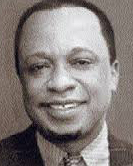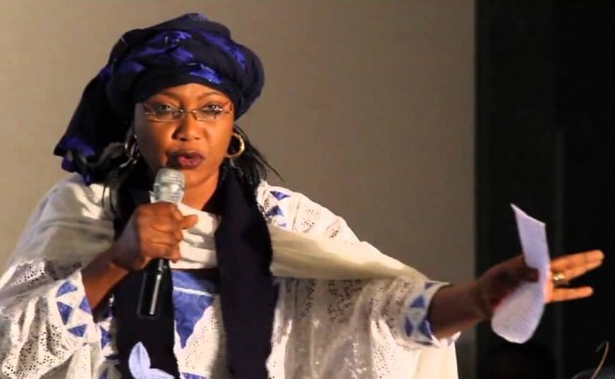The neighbourhood at Sangotedo, near Lagos, is graveyard-quiet, and so is his house. Wife and two kids had long gone to bed. At a table in a corner of the living room, where he normally writes because there is no spare room for a study, he is happily pounding the keys on his laptop when it struck.
He buries his face in his palms and remains sitting, hoping that it would be momentary. For over two minutes, no luck. Sometimes staring at the white ceiling became the magic, but this time it refuses to provide a solution. A little insect crawls on it leisurely causing a distraction. He ignores it and walks to the window on his left for a puff of fresh air on his face. There is a massive inflow of cool fresh air that indicates the likelihood of rain.
“Good stuff,” he says, and waits. Five long minutes! No luck. Samson is trying to remember a word to finish a beautiful sentence he had formed during diner. Without that particular word, the sentence had no colour, no beauty.
As he walks back to his desk in frustration, he remembers a story he had read about OJ Simpson.
Advertisement
“Oh goodness!” he muttered. “Do I now have CTE? A 39-year-old!”
Impulsively, he does a Google search for the story. Fighting panic, he reads it slowly. “The ex-NFL star said, ‘I have days when I can’t… I lose words, and I can’t come up with a simple word. I can’t remember a phone number, so forget that.
‘I get concerned. I do recognise that it probably affects you in short-term memory more than long-term. I know with me, I have days I can’t find words.
Advertisement
‘I literally cannot find words or the name of somebody I know. That gets a little scary. Those days happen when I’m tired.’”
Chronic traumatic encephalopathy (CTE) is a type of dementia associated with repeated blows to the head and recurrent episodes of concussion. It is particularly common in people who have played contact sports, such as boxing or American football.
After reading it, he logs off sadly, switches off the light and heads for the bedroom. As he turns the knob quietly, so he doesn’t disturb her sleep, the word explodes in his brain. “Coquettish!” His wife had done it a lot when they were dating, and that was what he needed to write the following: “Dami walked slowly and reluctantly to her door, spun around and looked at him coquettishly. He froze, rooted to the spot, his heart beating widely…”
He shakes his head, refuses the temptation to return to the desk, and opens the door. As he does, Tola turns towards him and says with a smile, “Oh, you are back early; how sweet!”
Advertisement
He said nothing!
The futile search for a word or two, or the right phrase is another of the challenges writers face. It is very common. This one gets a lot of people stuck: they know exactly what they want to say, but can’t decide on how they want to say it. It looks like a simple problem, but it is capable of stopping the flow of ideas, causing temporary frustration for one to suspend writing. In some people, it causes headache and more frustration. The loss of time is also painful. You sit there eager to write but nothing is happening! Yet time waits for no man, it ticks away.
Writers and psychologists have a simple but effective solution to this. Rather than brooding over the loss of memory and beating yourself up, get up; take a break and clear your mind. Sometimes difficulty in remembering is caused be interference. For example, something you just experienced or feel strongly about may be the thoughts that flow back, blocking away those things you make efforts to remember.
However, in newsroom situations or speechwriting with close deadlines, one may have to fill in the gap with similar words or phrases, highlight them for review during editing later and move on.
Advertisement
Clara Heart, writer and editor, describes a worse version of this is as a situation where the writer knows where he is going, knows exactly what he wants to happen in your story but can’t figure out how to get there. Maybe you even have your major points all outlined out for you. Yet, despite knowing exactly what you’re doing, somehow you find yourself stuck somewhere in the middle, and you can’t seem to force your way through it to get where you want to end up.
Writer’s block is defined as the condition of being unable to think of what to write or how to proceed with writing. There are many causes.
Advertisement
Financial pressures
Many people like to write; and there is roomful of genres and types of writing for everybody, but not all of them are gifted to write.
Advertisement
Gifted writers need little or no motivation to write. They are fired to write from inside of them, and as one writer puts it, if they don’t write their blood will freeze. Success is more easily achieved in one’s gift zone, which is the only place one can also find true joy.
This category of writers may be challenged but they are unlikely to lose their motivation or be discouraged by rejection of their works, poor sales of earlier works or financial pressures on the family.
Advertisement
Those are circumstantial issues: financial pressures and difficulties of paying bills; with life getting in the way, leaving one to struggle to get everything.
Situations like this, so prevalent in Africa, have caused people to abandon writing – some of them forever.
Uzor Maxim Uzoatu
“Writer’s block is a disease of one-dimensional writers. If the poetry gets blocked somewhat, one can switch to fiction or the drama or non-fiction, or other forms of writing. The real writer’s block for many people is “lackoffunditis”, a bad disease coined from lack of funds with which to feed the family,” says Uzoatu, a highly respected Nigerian poet and journalist, who has, however, refused to be blocked by circumstances.
He adds, “I respect the fact that my wife and children did not ask me to become a poor poet. Going to get something for them to live by is the real writer’s block.”
Uzoatu is one of the people who are wired to write, so he has been steadfast over the years, explaining that,”Well, I’m not in any particular hurry. Whether the book gets published at age 18 or 90, what really matters is the decision of Father Time on the work. In the face of poor sales or the absence of publishers, the writer’s one duty is to write on.
It does not matter if the works are not published in one’s lifetime. After all, Kafka’s masterpieces were published posthumously. These alibis are not enough reasons to plead guilty to the so-called writer’s block. In the end, every writer is known for one book, or at the most two, even after publishing many titles.
There are other forms of writer’s block like: the inability to come up with a solid idea; too many ideas; too much time spent away from writing; and burned out – stressed. Many writers have spoken about it.
Stephen King: There may be a stretch of weeks or months when it doesn’t come at all; this is called writer’s block. Some writers in the throes of writer’s block think their muses have died, but I don’t think that happens often; I think what happens is that the writers themselves sow the edges of their clearing with poison bait to keep their muses away, often without knowing they are doing it.”
Okey Ndibe: Professor Ndibe is a world-famous novelist based in the US: “I’m somewhat fortunate not to be plagued too much by the monster called writer’s block. I’ve hardly had to face or fend off this terror, at least not in the sense many writers experience it–as the absence of the next novel, poem, play or essay to write, or a blocked pathway through a work-in-progress. I find that, in my head, there’s always a surfeit of stories, novels especially, waiting to be written, to be given a shape fit for publication.
I’m also fortunate in having agents and publishers, in the US and Nigeria, who are quite interested in looking at and facilitating my work. So, my problem is a strategic one, instead of a “block.”
I tend to write in an over-deliberate, some would say awfully slow, mode. I tend to quarrel a lot with sentences. As a result, I write and rewrite sentences–sometimes interminably. That means that I don’t ever have that sensation of swiftness in husbanding a creative work in development. At the rate I go, I suspect that, when I die, I’ll be buried with many stories–potential books–that haunted my imagination, but never got written.
Even so, I hold out hope of eventually coming to some rapprochement with language. I’d like to come to a place where language either yields its beauties more readily or I learn to forgive its slipperiness.
That sums up my brand of writer’s block. Still, I know of writers who, between books, feel lost. Some have told me of wondering if the drought of ideas would prove crippling and permanent. They are seized by the dreadful prospect that the next book may never come.
I’m not exempt from a version of that anxiety. In the perilous world of publishing and readership, with their prodigal ways, their constantly changing fashions and tastes, a world in which today’s celebrated writer could well become tomorrow’s pariah, I’m aware–no serious writer isn’t–that rejection is always around the corner, an ever-present threat and reality. Yet, the most committed writers never permit themselves to be deterred or disillusioned by that prospect; they write, in spite of it. That’s why I’ll keep writing. For writing, to me, is the best antidote to memorylessness, the most efficacious stay against confusion and silence–to invoke and paraphrase the title of a book by Ron Hansen.”
Maya Angelou: “What I try to do is write. I may write for two weeks ‘the cat sat on the mat, that is that, not a rat.’ And it might be just the most boring and awful stuff. But I try. When I’m writing, I write. And then it’s as if the muse is convinced that I’m serious and says, ‘Okay. Okay. I’ll come.’”
Ernest Hemingway: “The best way is always to stop when you are going good and when you know what will happen next. If you do that every day … you will never be stuck. Always stop while you are going good and don’t think about it or worry about it until you start to write the next day. That way your subconscious will work on it all the time. But if you think about it consciously or worry about it you will kill it and your brain will be tired before you start.”
Add a comment







